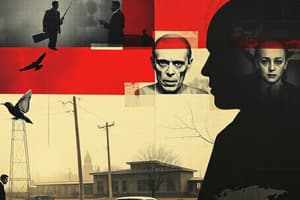Podcast
Questions and Answers
What is the causal model for biosocial theories?
What is the causal model for biosocial theories?
biology/genetics --> crime and an interaction with social
What is a biosocial theory?
What is a biosocial theory?
Criminal behavior based on biological aspects, behavior, and environment.
What is the testosterone and crime theory?
What is the testosterone and crime theory?
Higher levels of testosterone cause criminality.
What is the theory of IQ and criminality?
What is the theory of IQ and criminality?
What is the life course and adolescence-limited theory by Moffitt, Lynam, and Silva?
What is the life course and adolescence-limited theory by Moffitt, Lynam, and Silva?
What is ANS functioning and arousal in neurophysiology theory?
What is ANS functioning and arousal in neurophysiology theory?
What is the behavioral and molecular genetics theory?
What is the behavioral and molecular genetics theory?
What are some policy implications of biosocial theories?
What are some policy implications of biosocial theories?
What are the dependent and independent variables in biosocial theories?
What are the dependent and independent variables in biosocial theories?
What is the order of theorists starting from deterrence to biosocial?
What is the order of theorists starting from deterrence to biosocial?
Biosocial theories operate at the micro level.
Biosocial theories operate at the micro level.
Flashcards are hidden until you start studying
Study Notes
Causal Model of Biosocial Theories
- Interaction between biology/genetics and social factors influences crime.
- Biological predisposition towards crime may be triggered by social characteristics.
Definition of Biosocial Theory
- Criminal behavior arises from the interplay of biological, behavioral, and environmental elements.
- Emerged in the 1970s and incorporates genetics, brain functions, neurology, nutrition, and biochemistry.
- Concept of "nature via nurture" highlights the interaction between biological and social environments.
Testosterone and Crime Theory
- Higher testosterone levels are correlated with increased criminality.
- Environmental factors such as social integration and prior delinquency are essential for this relationship.
- Found a weak correlation with actual criminality.
IQ and Criminality Theory
- Cognitive disadvantages contribute to criminal behavior.
- Influencing factors include nutrition, education, socioeconomic status (SES), and family environment.
- Challenges include issues with testability and tautological reasoning.
Moffitt, Lynam, and Silva's Life Course Theory
- Peak crime rates occur in late teens to early twenties.
- Changes in education, family structure, and SES over time affect criminal behavior.
- Relationship with crime identified as weak.
ANS Functioning and Neurophysiology Theory
- Slow arousal and reaction times in the Autonomic Nervous System (ANS) are linked to aggressive and antisocial behavior.
- Lower levels of prosocial behavior increase tendency to commit crimes.
- Criminal or deviant behaviors are often learned through environment.
Behavioral and Molecular Genetics Theory
- Research indicates genes do not directly cause behavior but influence behaviors and emotions.
- Adoption studies confirm genetic predispositions can be inherited.
- Twin studies measure behavior concordance to assess genetic influence on behavior.
Policy Implications
- Focus on rehabilitating offenders.
- Emphasis on deterrence strategies to prevent crime.
Variables in Biosocial Theories
- Dependent variable: Crime.
- Independent variable: Biology/genetics.
- Third variable: Social factors influencing behaviors.
Order of Theorists in Crime Theories
- Deterrence: Beccaria and Bentham.
- Biological theories developed by Lombroso, discredited by Goring, Hooten (discredited Goring), and Sheldon (discredited Hooten).
- No notable figure for biosocial theories.
Level of Biosocial Theories
- Considered a micro-level analysis, focusing on individual behaviors and characteristics.
Studying That Suits You
Use AI to generate personalized quizzes and flashcards to suit your learning preferences.




